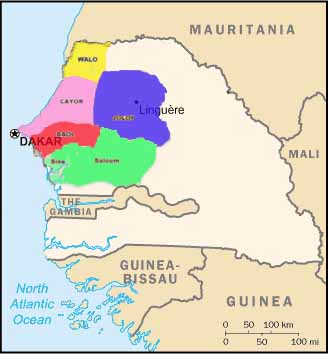|
Jom Or The History Of A People
Jom (or The History of a People) is a 1982 Senegalese color film by Ababacar Samb Makharam. Synopsis ''Jom'' is the source of all virtues: dignity, courage, a certain beauty of gesture, loyalty to commitment, respect for others and for oneself. The embodiment of African memory, Khaly the griot spans the ages to bear witness to the extent to which the ''Jom'' is at the root of resistance to oppression: a resistance that pits the colonizer against the enslaved people, the master against the servant, the factory owner against the workers. Plot In a deprived neighborhood, Gramimina vents her anger on her painter husband, for he fails to cover the household expenses. Another woman kicks her husband out for the same motives. A man enters and sparks his wife's (Aminata Fall) fury because he spent the night outside the house. During a meal, the griot Khaly says to a young audience, “My word is a maxim. It resembles an elastic band that stretches without snapping. It is an absolute ... [...More Info...] [...Related Items...] OR: [Wikipedia] [Google] [Baidu] |
Ababacar Samb Makharam
Ababacar Samb Makharam (also Ababacar Samb-Makharam or Samb for short, Dakar, Senegal, 1934 – Dakar, 1987) was a Senegalese filmmaker, actor, screen writer and film producer with his own company Baobab Films. Biography Born in Dakar, Samb Makharam was a pupil of the Navy school ''Centre de Formation Professionnelle de la Marine de Dakar'' in 1950–1951 and worked in a law firm (1952–1953). He then left for Paris in France and attended the ''École française de radioélectricité Rue Amyot'' (1954–1955, now EFREI Paris). From 1955 up to 1958 Samb Makharam trained as an actor at the ''Centre d’Art Dramatique de la Rue Blanche'' in Paris and performed in the movies ''Tamango'' (1957) directed by John Berry and ''Les Tripes au soleil'' (1958) by Claude Bernard-Aubert. In 1955 he founded the Paris theater group ''Les Griots'' uniting various Antillean and African actors such as Timité Bassori, Toto Bissainthe, Robert Liensol ( fr) and Sarah Maldoror. From 1959 to 1962 ... [...More Info...] [...Related Items...] OR: [Wikipedia] [Google] [Baidu] |
ZDF
ZDF (), short for (; ), is a German public-service television broadcaster based in Mainz, Rhineland-Palatinate. Launched on 1 April 1963, it is run as an independent nonprofit institution, and was founded by all federal states of Germany (). ZDF is financed by television licence fees and advertising revenues. The broadcaster is well known for its famous programmes , a newscast established in 1963, and , an entertainment show that premiered in 1981, with a suspension from 2014 to 2021. Norbert Himmler, ZDF's director general, was elected by the ZDF Television Council in 2021. History In 1959, the government of Konrad Adenauer began preparations to form a second nationwide television network with the intention of competing with ARD. Adenauer perceived ARD's news coverage to be too critical of his government, and believed that two of the organizations primarily responsible for its news reporting – the ''Deutsche Presse-Agentur'' and ''Nordwestdeutscher Rundfunk'', whi ... [...More Info...] [...Related Items...] OR: [Wikipedia] [Google] [Baidu] |
Wolof Language
Wolof (; Wolofal: ) is a language of Senegal, Mauritania, and the Gambia, and the native language of the Wolof people. Like the neighbouring languages Serer and Fula, it belongs to the Senegambian branch of the Niger–Congo language family. Unlike most other languages of the Niger-Congo family, Wolof is not a tonal language. Wolof is the most widely spoken language in Senegal, spoken natively by the Wolof people (40% of the population) but also by most other Senegalese as a second language. Wolof dialects vary geographically and between rural and urban areas. The principal dialect of Dakar, for instance, is an urban mixture of Wolof, French, and Arabic. ''Wolof'' is the standard spelling and may also refer to the Wolof ethnicity or culture. Variants include the older French , , , Gambian Wolof, etc., which now typically refers either to the Jolof Empire or to jollof rice, a common West African rice dish. Now-archaic forms include ''Volof'' and ''Olof''. English is believed ... [...More Info...] [...Related Items...] OR: [Wikipedia] [Google] [Baidu] |
Drama (film And Television)
In film and television, drama is a category or genre of narrative fiction (or semi-fiction) intended to be more serious than humorous in tone. Drama of this kind is usually qualified with additional terms that specify its particular super-genre, macro-genre, or micro-genre, such as soap opera, police crime drama, political drama, legal drama, historical drama, domestic drama, teen drama, and comedy-drama (dramedy). These terms tend to indicate a particular setting or subject-matter, or else they qualify the otherwise serious tone of a drama with elements that encourage a broader range of moods. To these ends, a primary element in a drama is the occurrence of conflict—emotional, social, or otherwise—and its resolution in the course of the storyline. All forms of cinema or television that involve fictional stories are forms of drama in the broader sense if their storytelling is achieved by means of actors who represent ( mimesis) characters. In this broader sense, dra ... [...More Info...] [...Related Items...] OR: [Wikipedia] [Google] [Baidu] |
Le Monde
''Le Monde'' (; ) is a French daily afternoon newspaper. It is the main publication of Le Monde Group and reported an average circulation of 323,039 copies per issue in 2009, about 40,000 of which were sold abroad. It has had its own website since 19 December 1995, and is often the only French newspaper easily obtainable in non-French-speaking countries. It is considered one of the French newspapers of record, along with '' Libération'', and ''Le Figaro''. It should not be confused with the monthly publication '' Le Monde diplomatique'', of which ''Le Monde'' has 51% ownership, but which is editorially independent. A Reuters Institute poll in 2021 in France found that "''Le Monde'' is the most trusted national newspaper". ''Le Monde'' was founded by Hubert Beuve-Méry at the request of Charles de Gaulle (as Chairman of the Provisional Government of the French Republic) on 19 December 1944, shortly after the Liberation of Paris, and published continuously since its first edit ... [...More Info...] [...Related Items...] OR: [Wikipedia] [Google] [Baidu] |
Positif (magazine)
''Positif'' is a French film magazine, founded in 1952 by Bernard Chardère in Lyon. It is one of two major French-language film magazines, created several months after '' Les Cahiers du cinéma''. The magazine is headquartered in Paris and is published monthly. Traditionally, ''Positif'' has served as a counterpoint to ''Les'' ''Cahiers du cinéma'', focusing on film themes and scripts, in contrast to politics and aesthetics. In the 1950s, ''Positif'' was associated with the non-Communist left (while ''Les Cahiers du cinéma'' originally held political affiliations with the right). Today, ''Positif'' is a neutral publication run by volunteers. The magazine was edited by Eric Losfeld from 1959. After publishing an article about Orson Welles in 1963, Michel Ciment became a member of the magazine's editorial committee. In 1966, he was promoted to editor in chief, a post he continues to occupy today. ''Positif'' has been printed by different publishers throughout the years and i ... [...More Info...] [...Related Items...] OR: [Wikipedia] [Google] [Baidu] |
Village Voice
''The Village Voice'' is an American news and culture paper, known for being the country's first alternative newsweekly. Founded in 1955 by Dan Wolf, Ed Fancher, John Wilcock, and Norman Mailer, the ''Voice'' began as a platform for the creative community of New York City. It ceased publication in 2017, although its online archives remained accessible. After an ownership change, the ''Voice'' reappeared in print as a quarterly in April 2021. Over its 63 years of publication, ''The Village Voice'' received three Pulitzer Prizes, the National Press Foundation Award, and the George Polk Award. ''The Village Voice'' hosted a variety of writers and artists, including writer Ezra Pound, cartoonist Lynda Barry, artist Greg Tate, and film critics Andrew Sarris, Jonas Mekas and J. Hoberman. In October 2015, ''The Village Voice'' changed ownership and severed all ties with former parent company Voice Media Group (VMG). The ''Voice'' announced on August 22, 2017, that it would cease pu ... [...More Info...] [...Related Items...] OR: [Wikipedia] [Google] [Baidu] |
L'Harmattan
Éditions L'Harmattan, usually known simply as L'Harmattan (), is one of the largest French book publishers. It specialises in non-fiction books with a particular focus on Sub-Saharan Africa. It is named after the Harmattan, a trade wind in West Africa. Description L'Harmattan was founded in 1975. In 2013 it produced 500 magazines and 2,000 new books per year, both in print and as e-books, and has a backlist of 38,000 books, 33,000 e-books, and 1,700 videos, with about a third each on Europe, Africa, and the rest of the world. A third of its titles are in literature, a tenth in history, and 5 per cent each in philosophy, current affairs, education, politics, sociology, and fine arts. Slightly fewer are published in economics, psychology, ethnology, languages, etc., but even these categories have hundreds of titles, for example 500 in languages, and more languages taught than almost any other publisher. L'Harmattan controls costs by requiring authors to prepare electronic man ... [...More Info...] [...Related Items...] OR: [Wikipedia] [Google] [Baidu] |
Cinema Of Africa
Cinema of Africa is both the History of film, history and present of the Filmmaking, making or screening of films on the African continent, and also refers to the persons involved in this form of audiovisual culture. It dates back to the early 20th century, when film reels were the primary cinematic technology in use. During the Colonialism, colonial era, African life was shown only by the work of white, colonial, Western filmmakers, who depicted Africans in a negative fashion, as exotic "others".Hayward, Susan. "Third World Cinemas: African Continent" in ''Cinema Studies: The Key Concepts'' (Third Edition). Routledge, 2006. p. 426-442 As there are more than 50 countries with audiovisual traditions, there is no one single 'African cinema'. Both historically and culturally, there are major regional differences between North Africa, North African and Sub-Saharan Africa, sub-Saharan cinemas, and between the cinemas of different countries. The cinema of Tunisia and the cinema of Egypt ... [...More Info...] [...Related Items...] OR: [Wikipedia] [Google] [Baidu] |
Cinema Of Senegal
The cinema of Senegal is a relatively small film industry which experienced its prime from the 1960s through to the early 1980s, but has since declined to less than five feature films produced in the last ten years. Cinematic history Early films: 1955–1969 The first Senegalese film, Paulin Vieyra's ''Afrique-sur-Seine'', was produced in 1955. Vieyra would follow up with further short films ''Afrique à Moscou'' (1957), ''Le Niger aujourd’hui'' (1958), ''Les présidents Senghor et Modibo Keita'', ''Avec les Africaines à Vienne'' and ''"Présence Africaine" à Rome'' (1959) and ''Indépendance du Cameroun, Togo, Congo, Madagascar'' (1960), a documentary covering the independence of these countries. However it was not until the independence of Senegal itself that the industry began to develop. Writer Ousmane Sembène became one of the country's leading directors during this period by turning many of his short stories into films. He was particularly concerned with social change, ... [...More Info...] [...Related Items...] OR: [Wikipedia] [Google] [Baidu] |





